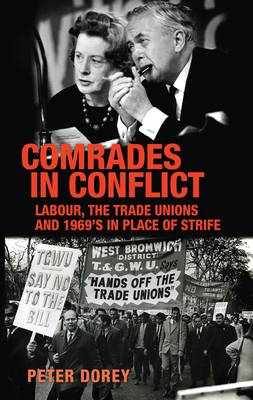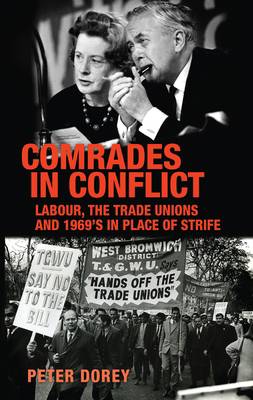
- Afhalen na 1 uur in een winkel met voorraad
- Gratis thuislevering in België vanaf € 30
- Ruim aanbod met 7 miljoen producten
- Afhalen na 1 uur in een winkel met voorraad
- Gratis thuislevering in België vanaf € 30
- Ruim aanbod met 7 miljoen producten
Zoeken
Comrades in Conflict
Labour, the Trade Unions and 1969's in Place of Strife
Peter Dorey
Paperback | Engels
€ 61,45
+ 122 punten
Uitvoering
Omschrijving
On the 50th anniversary of In Place of Strife, this scholarly study makes extensive use of previously unpublished archival and other primary sources to explain why Harold Wilson and Barbara Castle embarked on legislation to regulate the trade unions and curb strikes, and why this aroused such strong opposition, not just from the unions, but within the Cabinet and among backbench Labour MPs. This opposition transcended the orthodox ideological divisions, making temporary allies of traditional adversaries in the Party. Even Wilson's threats either to resign, or call a general election, if his MPs and Ministers failed to support him and Castle, were treated with derision. His colleagues called Wilson's bluff, and forced him to abandon the legislation, in return for a 'solemn and binding' pledge by the trade unions to 'put their own house in order' in tackling strikes.
Specificaties
Betrokkenen
- Auteur(s):
- Uitgeverij:
Inhoud
- Aantal bladzijden:
- 240
- Taal:
- Engels
Eigenschappen
- Productcode (EAN):
- 9781526148032
- Verschijningsdatum:
- 19/02/2020
- Uitvoering:
- Paperback
- Formaat:
- Trade paperback (VS)
- Afmetingen:
- 156 mm x 234 mm
- Gewicht:
- 340 g

Alleen bij Standaard Boekhandel
+ 122 punten op je klantenkaart van Standaard Boekhandel
Beoordelingen
We publiceren alleen reviews die voldoen aan de voorwaarden voor reviews. Bekijk onze voorwaarden voor reviews.











